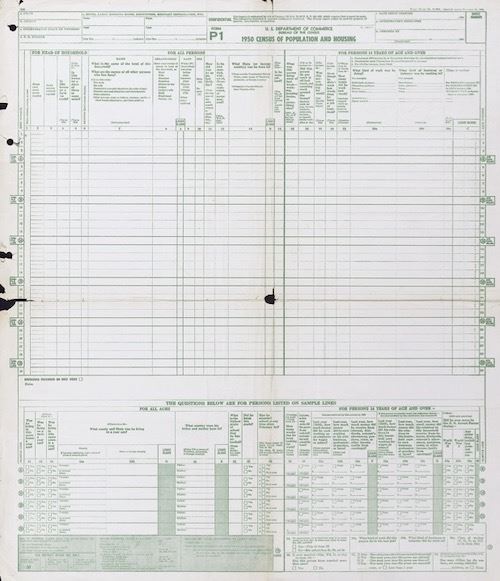On April 1, 2022, the 1950 United States census will be released to the public. (Hey! That's only a bit more than 5 weeks from now!) To get prepared for that release, you might want to review the questions that appear in that census.

The 1950 census population questionnaire asked fewer questions than its predecessor; the full population was asked only 20 questions. Enumerators asked additional supplemental questions of a 20 percent (questions 21–33) and 3.5 percent (questions 34–38) sample of the population. Enumerators asked the following questions, listed by column:
Population
Name of street, avenue or road where the household is located
Home or apartment number
Serial number of dwelling unit
Is this house on a farm (or ranch)?
If no, is this house on a place of three or more acres?
Corresponding agriculture questionnaire number
Name
Relationship to head
Race
Sex
How old was this person on his last birthday?
Is this person now married, widowed, divorced, separated, or never married?
Enumerators were to enter "Mar" for married, "Wd" for widowed, "D" for divorced, "Sep" for separated, or "Nev" for never married
What State or country was the person born in?
If foreign born, is the person naturalized?
For persons 14 years of age and over
What was this person doing most of last week - working, keeping house, or something else?
Enumerators were to record "Wk" for working, "H" for keeping house, "U" for unable to work, or "Ot" for other
If the person was "keeping house" or "something else" in question 15, did the person do any work at all last week, not counting work around the house? (Including work-for-pay, in his own business, working on a farm or unpaid family work)
If the person answered "no" to question 16, was he looking for work?
If the person answered "no" to question 17, even if he didn't work last week, does he have a job or business?
If the person was working, how many hours did he or she work in the last week?
What kind of work does the person do?
What kind of business or industry is the person in?
Class of worker the person is.
Enumerators were to mark "P" for private employment, "G" for government employment, "O" for own business, or "NP" for working without pay
Supplemental Questions for a 20 Percent Sample of the Population
For all ages
Was the person living in the same house a year ago?
If no to question 21, was the person living on a farm a year ago?
If no to question 21, was the person living in the same county a year ago?
If no to question 23...
What county (or nearest place) was he living in a year ago?
What state or foreign country was he living in a year ago?
What country were the person's mother and father born in?
What is the highest grade of school that the person has attended?
Enumerators were to mark "0" for no school; "K" for kindergarten; "S1" through "S12" depending on the last year of elementary or secondary school attended; "C1" through "C4" depending on the last year of undergraduate college education attended; or "C5" for any graduate or professional school.
Did the person finish this grade?
Has the person attended school since February 1st?
Enumerators could check a box for "yes" or "no" for those under thirty; for those over thirty, they were to check a box for "30 or over."
For persons 14 years and older
29. If the person is looking for work, how many weeks has he been looking for work?
30. Last year, how many weeks did this person not work at all, not counting work around the house?
31a. Last year, how much money did the person earn working as an employee for wages or salary?
31b. Last year, how much money did the person earn working at his own business, professional occupation, or farm?
31c. Last year, how much money did the person receive from interest, dividends, veteran's allowances, pensions, rents, or other income (aside from earnings)?
32a. If this person is the head of the household: last year, how much money did his relatives in this household earn working for wages or salary?
32b. If this person is the head of the household: last year, how much money did the person earn working at his own business, professional occupation, or farm?
32b. If this person is the head of the household: last year, how much money did the person receive from interest, dividends, veteran's allowances, pensions, rents, or other income (aside from earnings)?
33. If male: did he ever serve in the U.S. Armed Forces during...
World War II
World War I
Any other time, including present service
Supplemental Questions for a 3.5 Percent Sample of the Population
34. To enumerator: if the person worked in the last year, is there any entry in columns 20a, 20b, or 20c?
If yes, skip to question 36; if no, make entries for questions 35a, 35b, and 35c.
35a. What kind of work does this person do in his job?
35b. What kind or business or industry does this person work in?
35c. Class of worker
36. If ever married, has this person been married before?
37. If married, widowed, divorced, or separated, how many years since this event occurred?
38. If female and ever married, how many children has she ever borne, not counting stillbirths?
 Latest News Articles
Latest News Articles Do you have an RSS newsreader? You may prefer to use this newsletter's RSS feed at:
Do you have an RSS newsreader? You may prefer to use this newsletter's RSS feed at: